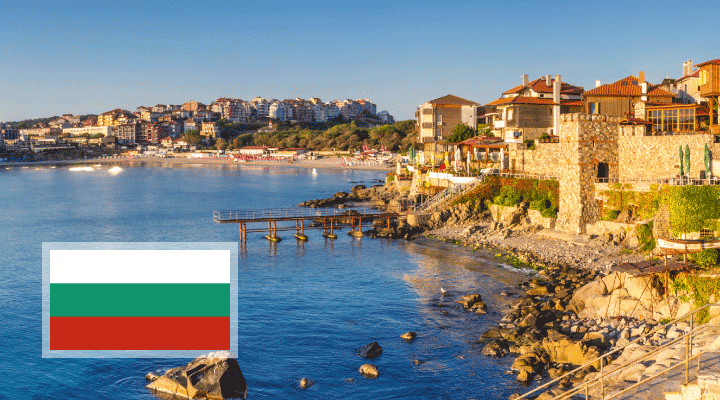The most important thing in brief
-
Geldanlage: In many European countries,
savings accounts offer higher interest rates than in
Germany due to local economic conditions.
-
Möglichkeiten: With Allianz, German
savers can open foreign fixed-term or overnight deposit
accounts to benefit from attractive interest rates.
-
Sicherheit: EU-wide deposit insurance
guarantees protection up to €100,000 per person and per
bank.
Gehen Sie direkt zu unseren Detailartikeln
Investing Abroad: A Smart Alternative?
German savers have received very low interest on their savings
in recent years – many banks even charged negative interest
rates. One major reason was the monetary policy of the European
Central Bank (ECB), which kept interest rates low to support the
economy – even amid the highest inflation in nearly 30 years.
This situation was unsatisfactory for savers, as it affected all
common saving forms – classic savings, fixed-term, and overnight
deposits.
Gradual interest rate hikes by the ECB since July 2022 brought a
turnaround, with interest rates on savings rising again. Despite
the first rate cut in June 2024, rates remain high. This means
savers can still benefit from attractive interest rates on their
deposits.
Why Are Interest Rates Higher Abroad?
Interest rates abroad are often higher than those available in
Germany. This is due to specific economic conditions in each
country. While ECB policy plays a role, many other factors
influence the supply and demand for savings.
These include the country's economic situation, savings
behavior, banking cost structures, and financial industry
competition. As a result, some foreign banks offer higher
interest rates on savings than German banks – even within the EU
or Eurozone. In the best case, this can help savers counter
inflation.

Fixed-Term Deposits Abroad
Fixed-term deposits allow savers to invest money for a specified
period at a guaranteed interest rate. They're ideal for saving
unneeded funds that won’t be used until later. The interest rate
remains unchanged throughout the term. However, this
predictability also means savers usually can't access their
funds during the fixed period. Nevertheless, fixed-term deposits
often yield higher interest than overnight deposits.
To the fixed deposit offers
Overnight Deposits Abroad
Overnight accounts are not tied to a fixed term. You can cancel
at any time and access your money – even abroad. Overnight
savings are best for short-term investment. Like fixed-term
deposits, foreign overnight accounts often offer higher interest
rates than German ones.
Transactions require an additional checking account, as
overnight accounts aren't suited for regular payments. Interest
is typically paid monthly, quarterly, or annually. Most banks
offer free account setup and management, and online banking is
widely available.
For short- to mid-term investors, a savings plan tied to an
overnight account may be worthwhile. With Allianz, savers
regularly benefit from attractive rates offered by partner
banks. You stay flexible, can access your balance at any time,
and adjust your saving rate as needed.
Compare offers now or choose one of the overnight accounts
ranked best by Finanztest for your savings plan.
In Which Currency Are Foreign Investments Held?
Foreign bank investments can be held in the local currency, in
euros, or in other widely used currencies like the US dollar
(USD) or Norwegian krone (NOK). This depends on the specific
fixed deposit offers. Euro-denominated investments eliminate
currency risk.
Investing in foreign currencies involves currency risk and
opportunity. If the currency strengthens against the euro,
savers not only receive their interest and principal back but
also gain from the exchange rate. If the currency weakens, a
loss occurs. Therefore, both the interest rate and currency
outlook should be considered when investing in non-euro
fixed-term deposits.
Security: Are Foreign Savings Safe?
Both fixed-term and overnight deposits abroad are protected
against bank insolvency. For banks within the EU, harmonized
deposit guarantee schemes apply. Some non-EU countries like
Norway and Switzerland also offer equal or higher protection
standards.
Under EU regulations, deposits up to €100,000 per person and
bank are legally protected by national deposit guarantee funds.
If insolvency is imminent, the responsible financial regulator
must confirm it within five business days. Once confirmed,
compensation must be paid to the customer within seven business
days.
Taxation: How Are Foreign Investments Taxed?
In Germany, investment income is subject to withholding tax if
the tax exemption threshold is exceeded. For foreign interest,
no German tax is withheld automatically – investors declare it
in their annual tax return.
Some foreign interest income is subject to withholding tax in
the source country. If the investor is subject to German income
tax, the German tax office offsets this against domestic tax
liability. As a result, the overall tax burden is similar to
domestic investment – only the process differs slightly.
Realized currency gains are also taxable, while currency losses
may be deductible.
Note:
The content on this page is for general information purposes
only and does not constitute tax advice. For detailed
information or to clarify individual tax questions, we
recommend consulting a tax advisor or another person qualified
under § 2 of the German Tax Consultancy Act (StBerG).
Our Partner Banks
At Allianz, the security of your investment is our top
priority when selecting partner banks. We only collaborate
with banks that are protected by a national deposit guarantee
scheme in accordance with EU regulations (including foreign
currencies) and that hold a full banking license from their
national regulatory authority. Additionally, all foreign
partner banks are registered with the German Federal Financial
Supervisory Authority (BaFin) as cross-border financial
institutions. Our German partner banks are supervised by both
BaFin and the European Central Bank (ECB).
Currently, savers can invest with over 140 partner banks
across Europe. Sweden remains one of the most popular
destinations for German savers. This is due to several
factors: the country’s AAA sovereign credit rating from
Standard & Poor’s, its low national debt, robust deposit
insurance reserves, and the solid financial position of
Swedish banks—all of which make saving in Sweden especially
attractive.
Investing in Sweden
How Can I Invest Money Abroad?
To invest your money abroad at attractive interest rates, you
typically need to open a foreign savings or fixed-term deposit
account. This process usually requires a verification procedure,
which can often mean appearing in person—especially within the
EU and sometimes beyond.
With Allianz, savers gain easy access to top offers from across
Europe. To find the best-fit offer for your needs, it's worth
comparing different domestic and international options available
on Allianz. Opening a savings, flex, or fixed-term deposit
account is fast, simple, and fully digital through our platform.
Registration and identity verification are completed quickly via
PostIdent or VideoIdent.
Your Benefits with Allianz at a Glance:
- Top interest rates: Attractive returns across Europe
- Free account opening and management
- TÜV-certified online banking platform
-
Simple & convenient: Register once, open multiple savings or
fixed-term accounts, manage everything in one place
Allianz’s user-friendly online banking also allows you to invest
in retirement products or ETF portfolios. While these investment
forms carry higher risks, they also offer the potential for
strong long-term returns.
Open a Allianz account now












































